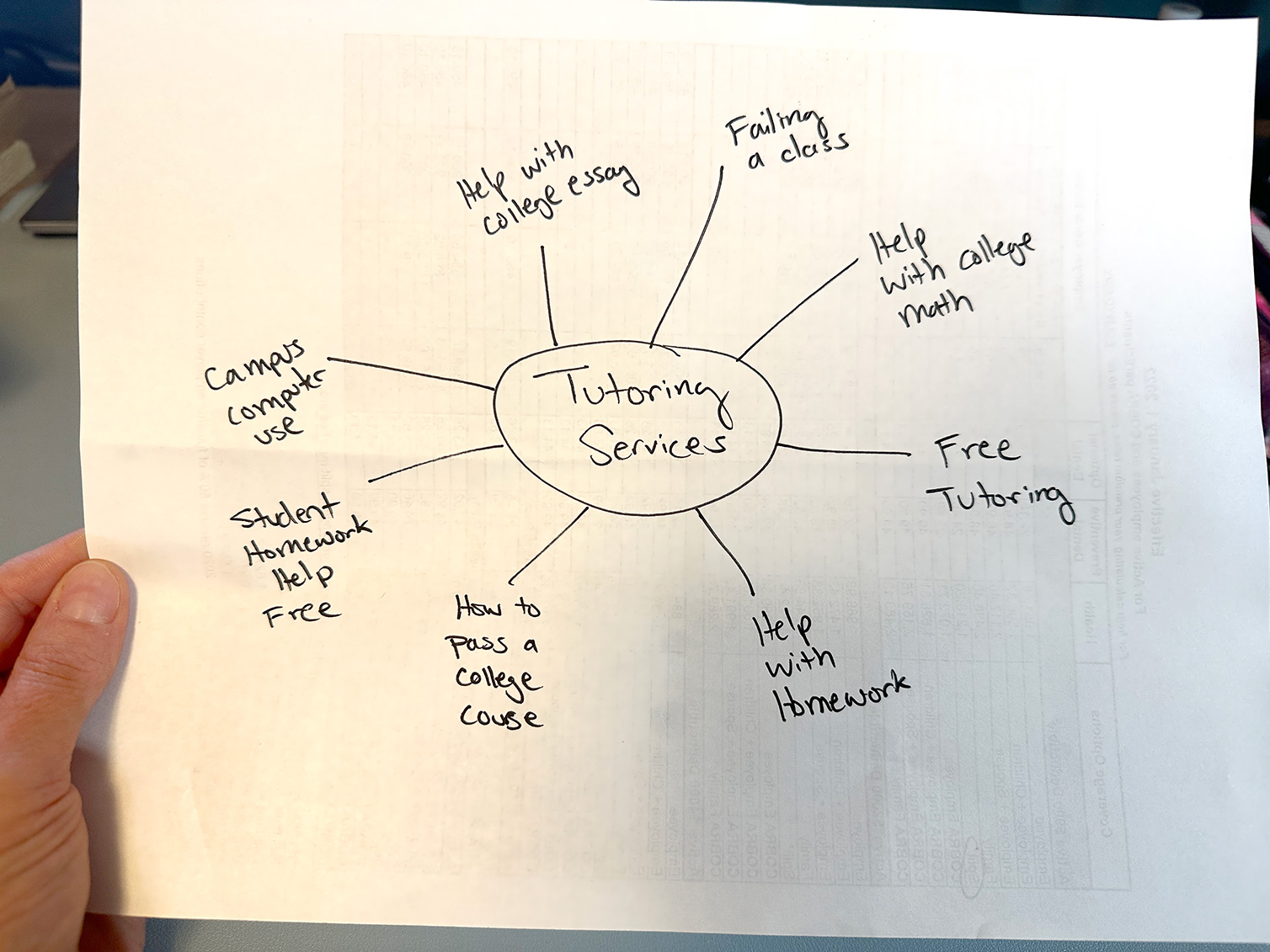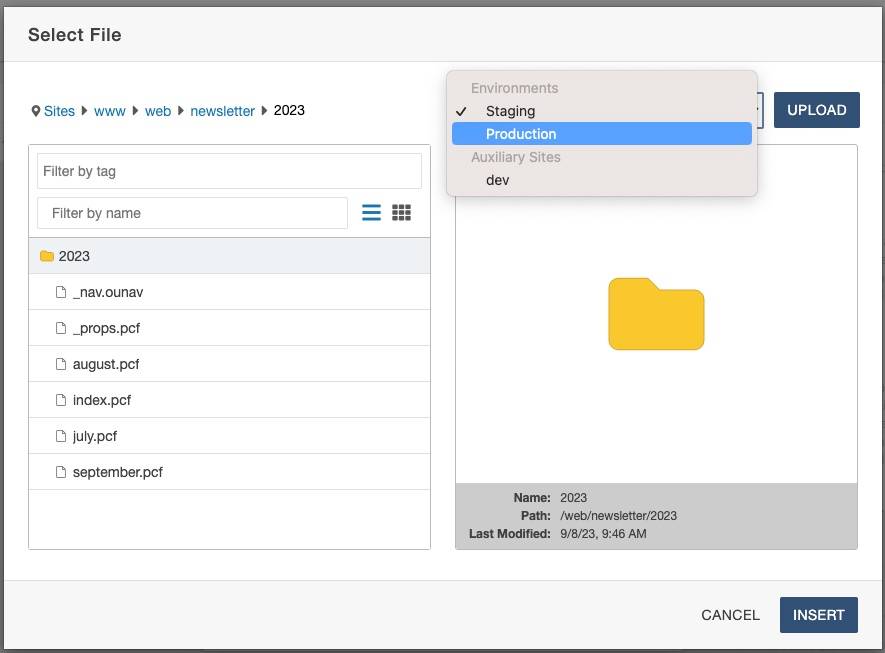Need additional assistance?
Check out our CMS tutorials
Attend one of our Virtual Open Labs hosted twice per week:
Tuesdays and Thursdays: 10 - 11 a.m. and 1:30 - 4 p.m. (academic year hours)
Don't forget the Request Help Gadget!
Located in the top right of your screen inside the CMS.
![]()
What do Meatloaf and Blogs Have in Common?
Published September 18, 2023

You know those nights when you don't know what to cook for dinner -- what's one of the first things you do? Most of us will reach for our phones, type something like "easy dinner recipe" and hit that magical search button that opens the world to thousands of ideas. If you're anything like us, you often see a recipe that looks delicious and when you click to the site, you're probably also annoyed by the story that precedes the recipe. We don't care about your hectic day that inspired an easy dinner recipe -- just give us the meatloaf recipe! (only kidding...kind of.)
So, why is this so important?
It isn't likely the recipe writer really wants to tell you a story about their journey to creating a perfect meatloaf. But the reason their recipe showed up in the search results above all others is simple - keywords and intent. They wrote enough keywords on their page to match what you searched for along with the same sentiment as how you were feeling. A quick Google algorithm later and they showed up in a top-rank of your search results page. We still only care about the meatloaf, but now you're a potential repeat customer. Pretty cool, right?
Tips for Writing Awesome Blogs
UWs Omni CMS contains a powerful set of templates that can help you build a sweet
blog, and if done well and frequently, can earn you some top ranked positions on your
page. We've created you a guide that will help you produce great content when you're
ready to build.
Don't know how to make a blog page in Omni?
Tip #1 - Narrow Down an Important Topic
Writing a blog about something very general is going to be tough to compete with on Google. Think about what matters to your audience. What do they like/dislike? What do they care about? Take a look at any previous survey data your department has collected or ask a group of 10-15 of your key customers (students, employees, alumni, etc.) what they wish they could find more easily on your website. Make sure it's something they're intersted in, not what you're interested in. There must be enough search volume for this to work!
Tip #2 - Find an Authentic Voice & Interview
Sentiment is everything. If you're attempting to attract more students to your department
or unit, find an actual student with real perspective of what it's like to benefit
from your service(s). Come up with some great questions why they chose your department
and how they benefits. Be sure to record your session so you can comeback to it for
your keyword research. If they are really interested, see if they are also willing
to write your blog for you after you've completed your research.
Tip #3 - Come Up With Good Keywords
We don't all have access to fancy keywords research tools. But, we do have access
to knowledge about our offerings. you can use free tools like Ubersuggest or try a keyword cloud by putting your topic in the center of a piece of paper. Draw
a circle around it with some lines out from the center and begin writing what you
think students would look for. Reference back to your student interview and research.
You can validate these through Ubersuggest or try them out in a Google search and
look at other suggested search ideas.

Keyword clouds are an easy way to get you thinking about your keywords. Try expanding
on them after you come up with an initial set!
Tip #4 - Write at Least 1,000 Words (and use your keywords!)
1,000 words may seem lengthy but these words give your blog a higher optimization score, so don't be shy. Keywords should be inserted multiple times and in headlines/subheadlines if possible.
Tip #5 - Format your Blog with Subheadlines & Prominent Callouts
Just like youre meatloaf recipe quest, searchers are looking for key points. Try a
"Top 10" list like this blog from Admissions or some "Top Tips" like this blog post! Find ways to break up your 1,000+ words into
skimmable content with the most important points in bold or a different heading. While
a visitor probably won't read your blog word for word, they'll quickly find their
information if they can easily recognize keywords in your most prominent content.
Tip #6 - Find Photos Related to Your Keywords
Find photos related to your keywords. If you're not a user of Canto, you should be! Its a cloud-based photo database available to all UW staff. You can
type keywords in related to your topic and often times, you'll get amazing results.
Be sure your downloading your photos as a smaller size (less than 500 KB) for optimal
page load times which is another factor in Google algorithm. Make sure your Alt Text
is descriptive. It's not only critical for ADA compliance, it's also...you guessed
it -- another factor in Google's algorithm!
Tip #7 - Add Links & Calls to Action
What step do you want your audience to take? Make sure you place a prominent button near the top and also one at the bottom that takes your site visitors to the next step. Think about the meatloaf...you're looking for the recipe! But maybe you're also looking for a "new pan" for the next time you make your meatloaf. Those are your secondary calls to action and could be useful for your site visitor if they're not quite ready to make a commitment to your main call to action. Don't be afraid to use links to other parts of the UW website. Google is looking for time spent on all our pages (not just yours). Be sure your'e linking to a page's dependency tag by dropping down the toggle in your link finder window!

Tip #8 - Publish and SHARE Your Blog
Now that you've published your blog, share it with the world! Page views - even if they don't come directly from a Google Search - count towards search engine optimization. Share to your department's social media or to your key audiences through other marketing channels such as email. Remember, they're the reason you wrote the blog in the first place.
Tip #9 - Come Up with an Ongoing Blog Strategy
You don't have to create weekly blogs to make a difference in your search engine optimization. Four blogs a year can do wonders as long as your topics match what your key audiences are looking for. If you're in charge of any type of marketing effort for your department, a strategy is key and research to back it up is even more important. Dedicate some time to help yourself come up with a plan using the guide above.
Want More Blog Tips?
If you're serious about creating a blog strategy, we recommend checking out this article from Sprout Social. And, guess what? We searched for "blog facts and tips" on Google and found it at
the top. #BlogsWork #SoDoesMeatLoaf ;)
Learn More About (SEO)
We've also put together and awesome page about Search Engine Optimization (SEO) if you really want to become an expert in the ways of Google!
Shelbey's Favorite Meatloaf
Institutional Marketing's web strategist, Shelbey Gunter, prefers the Lentil Loaf
from Sweet Melissa's and this tasty meatloaf recipe from Natasha's Kitchen.
Need additional assistance?
Check out our CMS tutorials
Attend one of our Virtual Open Labs hosted twice per week:
Tuesdays and Thursdays: 10 - 11 a.m. and 1:30 - 4 p.m. (academic year hours)
Don't forget the Request Help Gadget!
Located in the top right of your screen inside the CMS.
![]()
